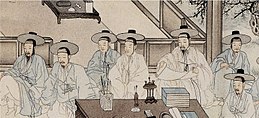
Back ثقافة كوريا الشمالية Arabic Култура на Северна Корея Bulgarian উত্তর কোরিয়া#সংস্কৃতি Bengali/Bangla Cultura de Corea del Norte Spanish فرهنگ در کره شمالی Persian Culture de la Corée du Nord French उत्तर कोरिया की संस्कृति Hindi 朝鮮民主主義人民共和国の文化 Japanese 조선민주주의인민공화국의 문화 Korean ਉੱਤਰੀ ਕੋਰੀਆ ਦਾ ਸਭਿਆਚਾਰ Punjabi
This article's tone or style may not reflect the encyclopedic tone used on Wikipedia. (September 2019) |


 |
| Part of a series on the |
| Culture of Korea |
|---|
| Society |
| Arts and literature |
| Other |
| Symbols |
|
The contemporary culture of North Korea is based on traditional Korean culture, but has developed since the division of Korea in 1945. Juche, officially the Juche idea, is the state ideology of North Korea. Juche displays North Korea's cultural distinctiveness as it is the origin and sole adopter of the ideology.[1]
Art in North Korea is primarily didactic, where cultural expression serves as an instrument for inculcating Juche ideology and the need to continue the struggle for revolution and reunification of the Korean Peninsula. Foreign governments and citizens, especially Americans[citation needed], are depicted negatively as imperialists; while revolutionary heroes and heroines are seen as saintly figures who act from pure motives. The three most consistent themes are martyrdom during the revolutionary struggle (depicted in literature such as The Sea of Blood), the happiness of the present society, and the genius of the leader.[1]
Kim Il Sung has been described as a writer of "classical masterpieces" during the anti-Japanese struggle. Novels created under his direction include The Flower Girl, The Sea of Blood, The Fate of a Self-Defense Corps Man, and The Song of Korea; these are considered "prototypes and models of Juche literature and art." A 1992 newspaper report describes Kim in semi-retirement as writing his memoirs—"a heroic epic dedicated to the freedom and happiness of the people."[1]
Due to North Korean Isolationism, the general population has little to no exposure to foreign cultural influences apart from performances by song-and-dance groups and other entertainers brought in periodically for limited audiences. These performances, such as the Spring Friendship Art Festival held annually in April, are designed to show that the peoples of the world, like the North Koreans themselves, love and respect the country's leader. During the 1980s and the early 1990s, the North Korean media credits Kim Jong Il for making the country a "kingdom of art." The North Korean Media claims Kim Jong Il is supposedly responsible for cultural policy.[1]
Pyongyang and other large cities offer the broadest selection of cultural expression. "Art Propaganda squads" travel to production sites in the provinces to perform poetry readings, one-act plays, and songs in order to "congratulate workers on their successes" and "inspire them to greater successes through their artistic agitation." Such squads are prominent in the countryside during the harvest season and whenever "speed battles" to increase productivity are held.[1]
North Korean society and culture through the lens of theater, film, and everyday performance make up an ideology-shaping matrix that not only entertains but also organizes and mobilizes society. The culture has a tremendous influence on the daily lives of people in North Korea.[2]